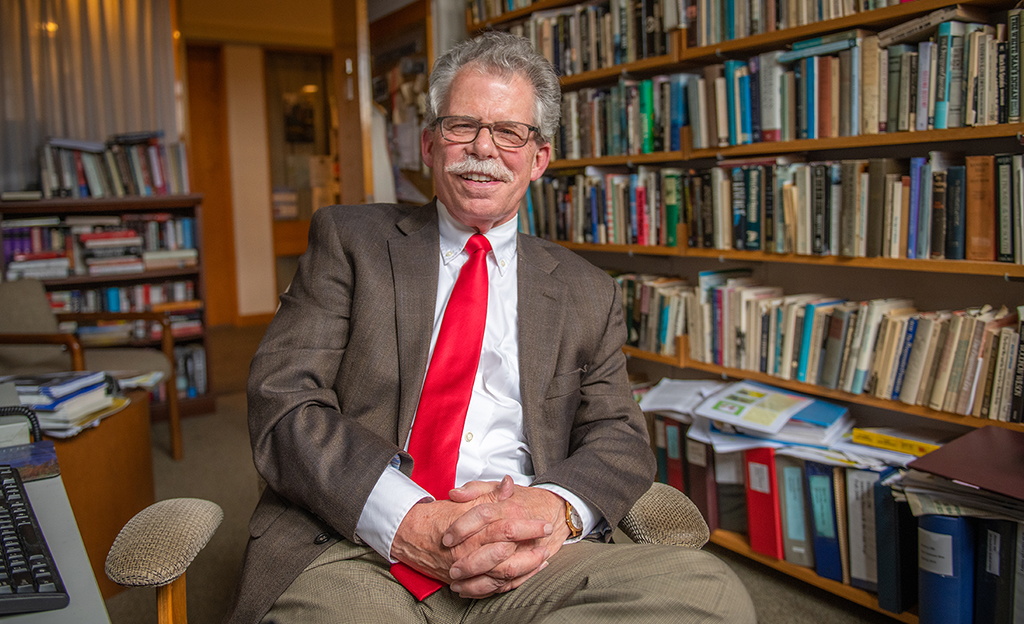‘Clark is a place where a single person can make a difference’

Doug Little had trouble sleeping last Sunday night.
His restlessness was not caused by a nagging worry or too much coffee, rather by the knowledge that his Monday would be unlike any other he’d experienced. That’s because on Monday, May 1, History Professor Doug Little taught his last class, and is retiring after 45 years at Clark.
“It’s not that I was worried about anything,” he recalls of his fitful Sunday. “But I couldn’t help reflecting on all the characters I’ve known, and the different aspects of my career. When you’ve been doing the same thing for 45 years, and then discover one day that you won’t be doing it anymore, it feels a little weird. Good, but weird.”
Retirement would have seemed a lifetime away when Little arrived at Clark in 1978. A product of the Midwest — born in Nebraska, schooled in Iowa, Minnesota, and Wisconsin before moving east to do his graduate work at Cornell — Little was hired on a two-year visiting appointment but was determined to see the professorship converted into a tenure-line position (it was).
There was never any doubt he and his wife Pat would settle in Worcester (“I’m a Type Triple A personality, and sitting in commuter traffic would have driven me slowly insane,” he says). As they became adjusted to the city they call home, Little built his Clark career as a diplomatic historian.
His research and teaching focus on U.S. foreign policy toward the Middle East came about through a bit of serendipity. Little, who was teaching a seminar on John F. Kennedy, had been hunkering down in the Kennedy Presidential Library in Boston to research Kennedy’s policies toward Africa. When one of his students submitted a paper about the JFK administration’s dealings with Israel, Little’s interest was piqued and he “took the plunge and began to look at Kennedy and Israel, Kennedy and Egypt.” He would broaden his research scope, and went on to write two books examining the United States’ fraught geopolitical relationships with the countries of the Middle East. (An earlier book delved into the origins of the Spanish Civil War.)
“Within certain limits, you can teach your research at Clark,” says Little, who from 2010 to 2019 held the Robert H. and Virginia N. Scotland Endowed Chair in History and International Relations. Professor Willem Klooster currently holds the chair.
Little is now finishing up a book about Ronald Reagan that he describes as “Reagan reconsidered,” exploring the mythologies built up around the late president.
Little’s career has extended well beyond the classroom and the stacks. He served from 2000 to 2007 as dean of the college, which he jokes “only seemed like an eternity.” He was proudest of his active role in helping get the construction of Academic Commons started, in collaboration with, among others, John Bassett and David Angel, who were president and provost at the time. The library continues to a treasured Clark destination for Little, and he maintains a small study there where he will continue to research and write.
He remained deeply involved in faculty governance over the years — serving as a member on a variety of committees, as past chair of the faculty, and as both a passionate advocate and vocal critic of policies and issues impacting Clark faculty.
He’s worked under five presidents, made enduring friendships, and taught thousands of students. The abiding allure of Clark, Little says, is that “it’s not tiny and it’s not a megaversity either. You get the chance to know your students and your colleagues.”
Much of that intimacy was lost during Covid, he notes, as classes and other operational functions were conducted remotely — a shift in mindset that continues to be felt, he says. “One of the things that concerned me about Covid was the absence of presence on campus. Teaching is best conducted in person — you need to be here.”
Little is an unabashed proponent of history as a vital academic major that “teaches you critical thinking, how to communicate, and how to crawl into someone’s head to figure out what makes a Trump, a Biden, or a Clinton what they are today.”
“I’m concerned that students may feel that majoring in something like history is risky because it does not guarantee the big job at the end of the four years and allow you to pay off your student loans immediately after graduating,” he says. “But there are so many things you can do with a history major. I remain confident the next generation of students will carry forward the traditions here at Clark and in the country as a whole. I have to be an optimist.”
Retirement will bring its own rewards. Little is looking forward to doing some traveling with Pat to visit family. He also expects to attend more WooSox games and, he says with a grin, have more time for “general kvetching.”
“I think I accomplished what I set out to do in terms of being a historian and also being a teacher,” he says of his 45 years at Clark University. “We like to say that Clark is a place where a single person can make a difference. We tell our students that, we tell our colleagues that, we tell ourselves that. And it’s true.”


